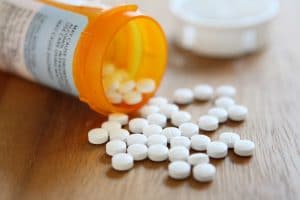Prescription Medication and Car Crashes – Who’s at Fault?
 It’s a given that drinking and driving is dangerous; not to mention that it’s against the law. If you are injured in a crash with a drunk driver, generally there is evidence to show that person was legally intoxicated. However, not as many people are as aware of the dangers of taking prescription drugs and driving. And with millions of Americans relying on prescription medications to manage various health conditions, it is important that everyone understands the side effects of those medicines.
It’s a given that drinking and driving is dangerous; not to mention that it’s against the law. If you are injured in a crash with a drunk driver, generally there is evidence to show that person was legally intoxicated. However, not as many people are as aware of the dangers of taking prescription drugs and driving. And with millions of Americans relying on prescription medications to manage various health conditions, it is important that everyone understands the side effects of those medicines.
Prescription drugs allow people with medical conditions to live a life they otherwise wouldn’t be able to. However, many medications have a downside, in the form of “adverse reactions.” Adverse reactions can cause some patients to experience significant side effects, some so serious a driver can cause car crashes and truck collisions if they make the choice to drive while medicated.
Common adverse reactions
The Food & Drug Administration (FDA) states that both prescription and over-the-counter (OTC) drugs can have side effects, ranging from minor to life-threatening: “Side effects, also known as adverse events, are unwanted or unexpected events or reactions to a drug. Side effects can vary from minor problems like a runny nose to life-threatening events, such as an increased risk of a heart attack.”
Every medication comes with a warning of side effects. Often, you will see a warning advising the patient not to operate heavy machinery. And this includes cars and trucks!
Some of the more common side effects of medications that can make it unsafe to drive include:
- Blurry vision
- Dizziness
- Drowsiness/sleepiness
- Excitability or agitation
- Fainting
- Inability to focus or pay attention
- Nausea
- Slowed movement and reflexes
The FDA also has a list of common medications that are known to affect the ability to drive. They also note that some of these drugs are even more dangerous in combination with each other. Here is just a sampling:
- Anti-seizure drugs
- Antihistamines
- Anxiety drugs
- Drugs containing codeine
- Motion sickness pills
- Muscle relaxants
- Opioid pain relievers
- Pills containing stimulants
Additionally, the FDA notes that cannabidiol (CBD) products and sleeping pills (like Ambien) specifically interfere with the driving process, causing a person to become excessively drowsy or even drive in a hypnotic state. Medications prescribed for insomnia especially can even affect users the next morning.
In New Jersey, prescription drugs are controlled substances, which is why you need a medical professional to prescribe them. The government regulates these types of medications because they have the potential to be mind-altering, dangerous, or addictive in some way. If a person taking medication fails to follow the warnings on the label, gets behind the wheel and causes a crash, they can be charged with driving under the influence.
If you are injured in a crash with an impaired driver, the NJ injury attorneys at Eichen Crutchlow Zaslow, LLP can help you seek compensation for your injuries and losses. Call one of our offices in Toms River, Edison, or Red Bank at 732-777-0100, or complete the contact form to schedule a consultation.

Eichen Crutchlow Zaslow, LLP has purposely remained small in size, because it is important to us that we get to know our clients and their needs. Larger NJ injury firms may churn out case after case, but that’s not how we operate. Partners Barry Eichen, William Crutchlow, and Daryl Zaslow have created a firm with the resources to handle complex litigation, and a team that takes your case personally.
Find out more about Eichen Crutchlow Zaslow, LLP
